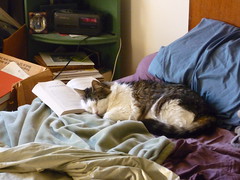Some books totally suck. Here’s how to make sure your book is one of them.
No Conflict
There are people out there who’ll tell you that you need tension on every page, or tension in every scene.
They’re wrong.
 The less tension, the better. Conflict is for aggressive people, and passive-aggression sells books. Besides, everyone knows people read just to enjoy the words you put on the page. Give them more words to mull over, less forward movement and action. If your character wants something, either have him/her give up, or give it to them quickly. Nobody wants to feel compelled to keep reading that way.
The less tension, the better. Conflict is for aggressive people, and passive-aggression sells books. Besides, everyone knows people read just to enjoy the words you put on the page. Give them more words to mull over, less forward movement and action. If your character wants something, either have him/her give up, or give it to them quickly. Nobody wants to feel compelled to keep reading that way.
No Emotion
All emotional writing is purple prose and should be eradicated. The stark contrast between the words on the page and what the character is most obviously feeling will not only move your readers to tears, but it will probably also win the Pulitzer. No, they’ll have to create a whole new award for your awesomeness, and name it after you.
If at all possible, convey emotion by naming the emotion. If not, assume your reader will understand.
No Effort
True genius springs forth whole from your Zeus-like mind, after all. Editing is for lesser talents. Rewriting? Only if you wanted to feel the genius of your words flowing through your veins again.
Remember that every word you type, write, say, breathe or think is holy. Anyone who attempts to defile your glorious paean with “suggestions” or “critiques” is beneath contempt. Crush them with your superior intellect.
Too Much Effort
If one adjective is good, why not three? Five? Seven? Description is what brings novels to life, so we’ll need reams of it, as florid as possible. You should be the next Shakespeare, so try to emulate his style (except for the blank verse bit). You should be inventing new words every few pages, scouring thesauruses so you never repeat something so common as “said,” and giving your characters vocabularies to rival Noah Webster’s. People read to learn, don’t they?
Starting Too Early
 The birth of your main character is probably too early. Nothing before age five or so, but from there, just pick up wherever it interests you. I mean, if you find it interesting, you know all your readers will. They’ll be just as riveted by those opening scenes of first-grade follies in your thriller as you are.
The birth of your main character is probably too early. Nothing before age five or so, but from there, just pick up wherever it interests you. I mean, if you find it interesting, you know all your readers will. They’ll be just as riveted by those opening scenes of first-grade follies in your thriller as you are.
Not Trusting the Reader
Every time you introduce a new concept or setting or character, make sure you take a minute to explain as much as you can about this person. Their life histories, current relationships, current SO’s opinion of them (especially if that SO is too far to bring him/her on the scene), home, hobbies, pets, etc.
But readers don’t have great memories, we know, so be sure to remind the reader of two to three of those facts every time we meet this character/setting/everything again.
Characters We Don’t Care About
We have got to have more avant garde literature out there. Blah blah blah sob story blah blah blah orphan—whatever. Let’s get really experimental. What about a character everyone will hate as the main character? People will sing your praises for decades. Nobody could ever come up with something so original. Again with the new award to honor your awesomeness!
Give Up
The best novels are the unfinish
What do you think? What are the best ways to ruin your novel?
Photo credits: Why did you do this to me look—Julia Roy; Cat asleep reading—Gerry Brague


Two-dimensional characters. They’re boring to read about and bring nothing to my “education” about people and humanity.
Oh yes, definitely! Thanks for your comment.
Hehe, this was a fun read 😉 I like that the post itself is unfinish….
😛
Glad you liked it, Trisha 😀 . I’m a fan of tha…
Awesome post! Fun and informative at the same time.
Thanks, Margot!
These are great. I got really nervous when I read the title of the post. =D
LOL. I’m sure you didn’t find yourself in here!
You forgot to mention dialogue. Honestly, if a writer is truly gifted, those reams and reams of florid description should tell the reader everything they need to know. Noone wants to hear it from the character’s point of view ;).
Oh, yeah! That’s the real reason readers read, right? To succumb to the awesome power of the author’s words. Not some silly story or character or experience.
Wow, Jordan! You’re doing so many wonderful things on your blog to help writers out:) Thanks!
Thanks, Deana! You’re so sweet–and you’re one to talk, doing wonderful things on YOUR blog to help writers out!